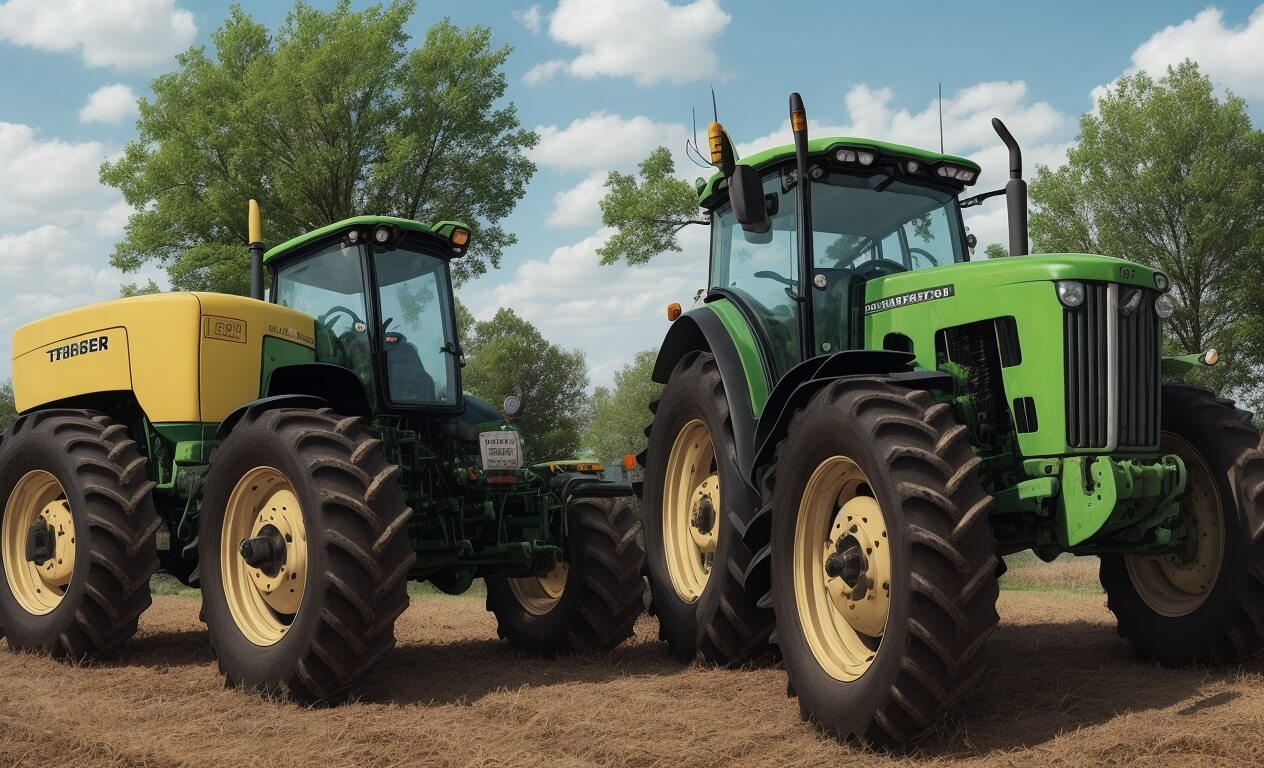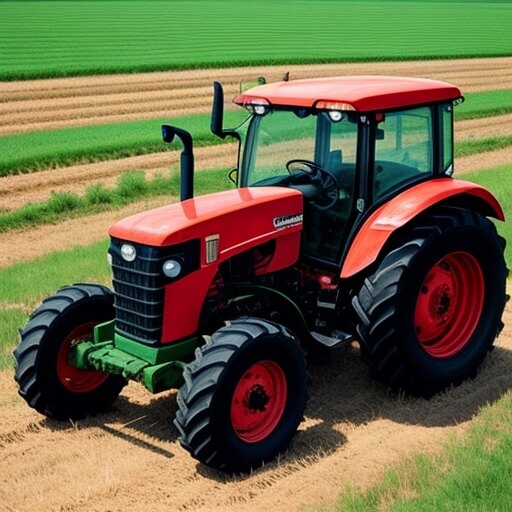
The integration of solar-powered technology has become the driving force behind increased efficiency and sustainability. One such innovation that is making waves in the farming community is the adoption of solar-powered farming equipment.
The Solar Revolution in Agriculture
Traditional farming, once heavily reliant on fossil fuels, has undergone a transformative shift with the introduction and evolution of solar-powered farming equipment. The inception of this solar revolution can be traced back to the growing awareness of environmental and economic challenges associated with traditional farming methods.
The early stages saw pioneers experimenting with solar technologies to power basic farm equipment. As solar panels became more efficient and affordable, the potential for widespread adoption became evident. The turning point came as the agricultural sector recognized the need for sustainable practices, prompting the development of more advanced solar-powered machinery.
Solar-powered tractors have emerged as key players in this evolution. These machines, equipped with solar panels, efficiently convert sunlight into energy, eliminating the reliance on conventional fuel sources. The continuous development of battery technology has further enhanced their usability, allowing farmers to operate even during non-daylight hours.
Solar-powered irrigation systems have also played a crucial role in this revolution. Water scarcity concerns prompted the integration of solar energy to power irrigation, offering a sustainable solution while reducing operational costs. Additionally, solar-powered harvesting machines have streamlined the harvesting process, providing farmers with cleaner, cost-effective alternatives.
The history of solar-powered farming equipment is a story of innovation and adaptation. From the initial experiments to the present-day sophisticated machinery, this evolution reflects a commitment to sustainable agriculture.
Solar-Powered Tractors
The integration of solar-powered tractors into modern agriculture represents a harmonious fusion of technology and environmental consciousness. As these tractors plow towards a greener future, several key advantages emerge, shaping the landscape of sustainable farming.
By relying on solar energy, these tractors significantly reduce greenhouse gas emissions. The elimination of traditional fuel sources means fewer carbon emissions, contributing to cleaner air and a healthier environment. This shift aligns with global efforts to combat climate change and promotes a more ecologically balanced farming approach.
The economic benefits of solar-powered tractors are equally compelling. With the sun providing a free and abundant source of energy, farmers experience a substantial reduction in operating costs. The initial investment in solar technology is offset by long-term savings on fuel and maintenance, making it a financially prudent choice for agricultural practitioners.
The incorporation of advanced battery technology ensures that solar-powered tractors can operate beyond daylight hours. The stored solar energy enables farmers to continue their work during cloudy days or after sunset, providing flexibility in managing time-sensitive tasks. This adaptability enhances productivity and operational efficiency on the farm.
Solar-powered tractors typically have fewer moving parts compared to their conventional counterparts. This results in lower maintenance requirements and fewer breakdowns, translating to increased reliability and reduced downtime for farmers. The simplified design contributes to a more sustainable and resilient farming infrastructure.
As solar-powered tractors continue to gain momentum in the agricultural sector, their impact extends beyond individual farms. This technology sets a precedent for sustainable practices, encouraging a broader shift to cleaner and more efficient energy use in agriculture.
Solar-Powered Irrigation Systems
Amid growing concerns about water scarcity in agriculture, solar-powered irrigation systems emerge as a responsible and sustainable solution. Leveraging the abundant energy from the sun, these systems revolutionize the way water is sourced and distributed on farms, presenting several key benefits for both the environment and the farming community.
Solar-powered irrigation systems operate by harnessing solar energy to efficiently pump water. By eliminating the need for grid electricity or diesel generators, these systems significantly reduce the carbon footprint associated with traditional irrigation practices. The efficiency gains translate into a more environmentally friendly and resource-conscious approach to water management.
The financial advantages of solar-powered irrigation systems are noteworthy. Farmers experience a substantial decrease in operational costs as they tap into the sun’s energy to power water pumps.
Solar-powered irrigation promotes responsible water resource management. By relying on renewable energy, farmers minimize their reliance on scarce resources and contribute to the preservation of water ecosystems. This aligns seamlessly with the principles of sustainable farming, ensuring that water, a precious commodity, is used judiciously and with an eye toward long-term environmental sustainability.
Solar-powered irrigation systems offer operational independence to farmers. Freed from the constraints of traditional power sources, farmers can harness solar energy to irrigate their fields even in remote or off-grid locations. This autonomy enhances the resilience of agricultural operations and contributes to the creation of a more robust and adaptable farming infrastructure.
Solar-Powered Harvesting Machines
Solar-powered harvesting machines represent a paradigm shift by harnessing clean energy to carry out the intricate task of harvesting crops. By replacing traditional fuel sources with solar energy, these machines significantly reduce carbon emissions, contributing to a cleaner and healthier environment. This transition aligns seamlessly with the growing global emphasis on sustainable agricultural practices.
The financial advantages of solar-powered harvesting machines are a compelling aspect for farmers. As the machines rely on the sun’s energy, farmers experience a substantial reduction in operational costs associated with fuel consumption. The long-term cost-effectiveness makes these machines an appealing option for farmers seeking to optimize their operations and improve the overall economic sustainability of their farms.
The environmental friendliness of solar-powered harvesting machines goes beyond the reduction of carbon emissions. These machines typically have a lower environmental impact due to decreased noise pollution and soil compaction compared to traditional harvesting equipment. This reduction in environmental disturbance contributes to the preservation of the ecosystem surrounding the farmland.
Solar-powered harvesting machines offer adaptability and efficiency in varying weather conditions. The ability to store solar energy in advanced batteries enables these machines to operate during periods of low sunlight or at night. This adaptability ensures that farmers can optimize their harvesting schedules, contributing to increased overall efficiency in crop management.
Benefits Beyond the Fields
The benefits of solar-powered farming equipment extend beyond the immediate advantages in the fields. Let’s delve into the broader positive impacts of this revolutionary technology.
Environmental Sustainability
Solar-powered farming equipment significantly reduces reliance on fossil fuels, leading to a substantial decrease in carbon emissions. By choosing clean energy alternatives, farmers contribute to mitigating climate change and preserving the environment for future generations.
Cost Efficiency
While the initial investment in solar-powered equipment may seem daunting, the long-term cost savings are impressive. Farmers can enjoy reduced fuel and electricity bills, fewer maintenance costs, and government incentives for adopting sustainable practices.
Energy Independence
Solar-powered farming equipment provides farmers with a degree of energy independence. By generating their electricity on-site, farmers are less susceptible to fluctuations in fuel prices or disruptions in the power grid. This newfound independence empowers farmers to take control of their energy needs, fostering resilience in the face of changing economic and environmental conditions.
Farmers embracing this technology are not only reaping the benefits of increased efficiency and cost savings but are also important for fostering a more sustainable future. Solar-powered farming equipment it’s a beacon of hope for a more sustainable and prosperous agricultural industry.

